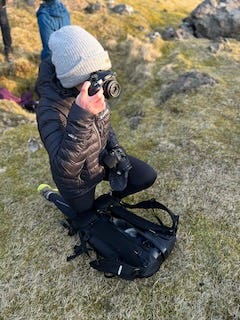(I’m noting the irony here as I’ve spent a week coming back and tweaking this as thoughts come and go, worrying about whether it’s “perfect” enough to publish).
Perfect circles exist in mathematics (I have this on good authority - but my own maths is truly shonky), a musical note can be perfectly in tune and a line perfectly straight (I feel like i’m about to be proven wrong on all these however I shall plough on regardless). But outside of these controlled, measurable spaces, perfection becomes a bit wonky and more of an idea than a reality. In creativity, and in life, "perfect" is subjective, an ever-changing concept, and always just out of reach.
A few days ago I found myself gawping up at a stone archway from the 11th century. I love my history and next to being in the mountains I can’t think of a better way to spend a lot of my time than wandering around an old ruin.
What struck me about this arch was the perfection in its lines. Just perfect, pleasing symmetry. And all of it built way, way before anything remotely techy existed. Just a pencil, some sand, and human brain cogs creating these perfect structures.
This set me off down a thought warren about perfection, how we pursue it, how it’s always just out of reach, dangling like a carrot on a string.
But when I looked closer at the archways, I noticed small imperfections. Nothing that made them less capable of their job, holding up a giant, impressive ceiling. But still, I spotted a slightly off chisel mark here, a minuscule misalignment there. Aha!
The Perfect Is the Enemy of Good
I was recently given a French podcast for homework (after a 15 year hiatus I’m painfully trying to learn French again) about the philosophy behind the pursuit of perfection (this took me a very long time to translate - Inner French is the name of the podcast and they have v helpful transcripts to shuffle you along).
Bien sûr out popped a rascally Voltaire quote: Le mieux est l'ennemi du bien. “The perfect is the enemy of good”, hmmmm ok, I pondered this upside down and inside out for a while. But don’t we want to be best? Wouldn’t we rather have “best” over “good”. We’re told to alway be our best, best behaviour, try our best, aim for perfect.
And my easily distracted and simultaneously fixated brain skittered off down into a mess of books and google, where I found a study of creativity and perfectionism (study credited to Jerry Uelsmann, a photography professor at the University of Florida):
Uelsmann divided his students into two groups:
One group was graded only on the quality of a single, "perfect" photograph.
The other group was graded on quantity, the more photos they took, the higher their grade.
The result? The more captivating and powerful images emerged from the group that had to take a 100 photos.
Why? Because they were free from the pressure of creating something perfect, they could experiment, fail, try again, make small adjustments.
Meanwhile, the group aiming for a single perfect photo on the whole panicked, stressed out, and were paralysed by overthinking, self-critiquing, and (drumroll) the fear of failure and didn’t come up with anything half as good as the other group.
Thinking back to filmmaking and the creative process, I remember the time we worked on multi-day events, where we had to turnaround a film every day. And whilst I would put my absolute all into editing these films, there literally was no time to worry about perfection. You just had to create.
The Perfection Obsession
But perfection is something I’m certainly guilty of chasing. I scroll through social media and feel the same old panic rising up from my gut as I measure myself against what my brain classifies as perfect (thanks to the insane “perfection” narratives we are fed from day dot and that are reconfirmed every time we open social media) perfect bodies, perfect faces, perfect hair, perfect coffee (perfect coffee cups - guilty), even the right kind of perfect fucking journal to journal in. We are faced daily with reminders that we’re not quite good enough, not quite measuring up to the fantasy we see online.
So why are we so obsessed with perfection?
Maybe because it offers the illusion of control in a scary world, more clarity, more happiness, more worth/validation as well as more money, or perhaps more power. More. The bog standard human pursuits.
I look back at films I made 10 years ago, cringing at their imperfections, picking them apart with cruel precision, wincing every now and then. But if I had never started, or pressed export on a project I wouldn’t be where I am now (which isn’t to say I’ve nailed it by any means, but I’m still working in the same industry and hopefully have made some marginal improvements since then).
Those films had a place, and a purpose. They weren’t perfect. I will never be perfect (gasp panic attack incoming).
Perfection Holds Us Back
The number of times I’ve told myself, I won’t start that thing until everything’s more perfect. Until I’m more… just more, I’ve lost count.
Perfectionism sets you up for a really bad shock when things do inevitably wobble and even the tiniest shit hits the fan. It locks you into a rigid mindset and leaves you incapable of dealing with the inevitability of failure.
A business coach once told us: You need rejection. You need to lose a pitch and realise that life goes on and your business will survive. You’ll grow and come back stronger. (shout out Neil Thubron)
I still don’t like it. I’m a freelancer running a business - hearing “No” is terrifying.
If we say for a moment perfection does exist (in this non logical sphere) - where do we go if we reach peak perfectionism?!
Nowhere. Game over. Do we just stop?
So what do we aim for if not perfection?
We hear "I’m a perfectionist" so often that it feels like a humblebrag. (Guilty as charged.) But what if perfectionism is also a tiny bit about ego, it keeps you looking inward instead of outward. You become obsessed with your own performance and identity to the point you are blinkered to what is going on around you.
From now on I’m going to call myself a curiousist. ( i’m coining it)
What if, we stopped aiming for perfect, and aimed to be more curious? Curious enough to know that we might fail but also curious enough to try.

The Trap of Perfectionism
Take body image, one of the most exhausting perfectionist traps, dictated by society patriarchal nonsense. (And whilst I’m writing as a woman, I know this affects all genders).
Be Twiggy. No, be a Kardashian. Be ripped. Have curves. Be waif-like. Big bum. No bum. Small boobs. Big boobs. Narrow shoulders, wide shoulders bla bla bla.
The goalposts for “perfect” never stop moving.
The system is setting us up to fail.
In the pursuit of perfection, especially the kind served up to us on social media as something achievable and aspirational, an analogy comes to mind, particularly when I think about body image: I imagine myself taking an e-bike to a mechanic.
(although I can write about this - I’m still getting my head around accepting it, I’m a work in progress)
Me: "I’d like my e-bike to look more like a truck."
Mechanic: "But it’s an e-bike. A brilliant, well-built, structurally sound e-bike that does a fabulous job at being an e-bike."
Me: "No, I want it to look like a truck. I’ve heard trucks are the most perfect thing in the world, and we’re going to make it look like a truck."
Mechanic (dubiously): "Okay, I’ll try, but it’ll take a lot of work forcing it to be more like a truck. And at its core, it will still be an e-bike."
Me: "I don’t care. Let’s do it."
Four weeks and a lot of money later, I push my e-bike/truck hybrid out of the shop, marvelling at its built-up frame, until I try to push it up a hill, and it all falls apart.
The e-bike wasn’t built to be a truck.
As analogies go this is pretty bloody obvious what I’m getting at, and I’m making light of a situation which I find very difficult. Forcing ourselves to fit impossible moulds, chasing an idea of "perfect" that isn’t us.
In fact, I’ll bang one more nail into the proverbial perfectionist coffin and go so far as to say “perfect” is boring. Transport would be useless if all we had were trucks.
The Creative Connection
This is why filmmaking, writing, and any creative pursuit require us to roll up and embrace imperfection.
(side note: the Japanese art of Kintsugi, fixing broken pottery with gold, instead of hiding the imperfect, making something even more beautiful out of the cracks and scars, you could also argue it’s a way of honouring the story behind the pottery, filling it with even more meaning.)
The best shots we’ve banked are often not the ones we’ve planned, but the one we stumbled into, perhaps the light hits differently, an unexpected story pokes out. Maybe the best story isn’t the polished one, but the one we dared to tell. Don’t wait until you have the best camera, or the perfect drone set up - just get out and start.

Because if we get stuck chasing perfection, we might never press that record/export button at all. And to be quite frank I don’t think creative perfection bloody well exists.
So really, you’re just traipsing the infinite uphill tarmac road of mind fuckery on a really hot day, waterless and with no shade, trying to keep up.
So now I’ve waffled on for a very long time I should just accept this article is not going to be perfect and just press the damn publish button and be done with it.
Team curious or team perfection?







